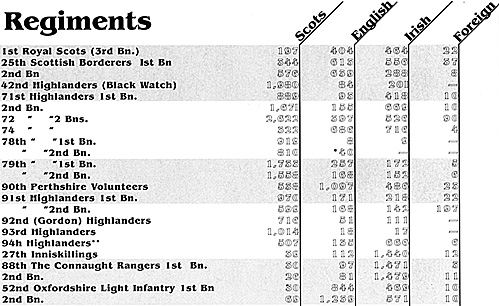Dr. Henry G. Farmer, member of the Society, has brought to our notice a booklet, An Account of the Scottish Regiments, published in Edinburgh by William P. Nimmo in 1862. Its object apparently was to controvert the assertion which according to its anonymous author was " so generally believed " that " the Highland Regiments were destitute of Scotsmen and principally composed of Irishmen." The author publishes figures which he obtained from an examination of the regimental record books and monthly returns. He deals with three different periods. The first of these is the most interesting from our point of view, as it embraces the period of the Peninsular and Waterloo campaigns, when it has been said that Wellington's armies contained a very large proportion of Irishmen. The other periods are in the decade irnmediately preceding the publication of the booklet. No figures are available for the 3rd (Scots) Guards, the 26th (Cameronians), the 70th (Glasgow Lowland Regiment), and the 73rd and 75th Highlanders. By way of contrast, in these returns the author gives the figures of two Irish and one English Regiment of the period and these also we attach:
The author advances an interesting theory to explain the large proportion of Irish in Scots Regiments, and indeed it furnishes a reason for the large proportion of them in English Regiments also. He gives the figures of the population of the three countries in 1811:
- England and Wales 10,150,000
Scotland 1,805,000
Ireland 5,937,000
He then points out that during this period there was one Scots Cavalry regiment (The Greys) and nineteen regiments of Foot of which latter several had second battalions; one the 21st, had as many as four battalions. During the same period Ireland had only four regiments of Horse and nine regiments of Foot. In effect, his argument is that the population of Scotland was not able to maintain the large number of regiments supposed to be recruited in that country. In the case of Ireland, on the other hand, with its then very large population, most of which was on the verge of starvation, the country had a potential recruiting strength far in excess of the requirement of its regiments. The effect of economic pressure, coupled with the naturally adventurous and militant spirit of the Irishmen, tended to fill English and Scots regiments with them. In some cases the author gives returns of the religious denomination of the men composing a regiment, and it is of interest that the number of Catholics always approximated to the number of Irishmen.

*English and Irish are given together at this figure.
**Later under the Carden reforms this regiment became the 2nd Bn. The Connaught Rangers.
Back to Age of Napoleon 27 Table of Contents
Back to Age of Napoleon List of Issues
Back to MagWeb Master List of Magazines
© Copyright 1998 by Partizan Press.
This article appears in MagWeb (Magazine Web) on the Internet World Wide Web.
Other military history articles and gaming articles are available at http://www.magweb.com